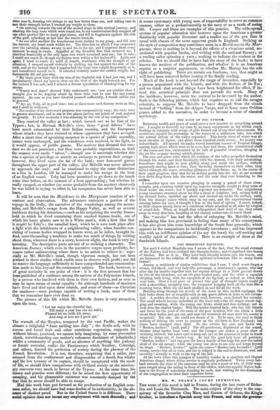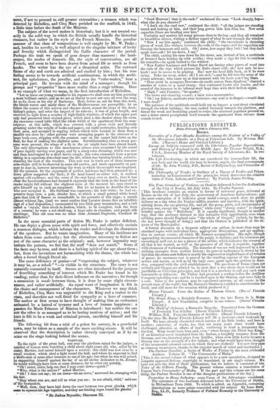MR. W. PEAHE'S COURT INTRIGUES.
THE scene of this novel is laid in France, during the last years of Riche- lieu and Louis the Thirteenth. The main subject of the story is the con- spiracy of the favourite Cinq Mars, and Gaston of Orleans' the King's brother, to introdece a Spanish array into Franeri and seise the govern. talent, if not to proceed to still greater extremities ; a treason which was detected by Richelieu, and Cinq Mars perished on the scaffold, in 1642, a little time before the death of the Minister.
The subject of the novel makes it historical; but it is not treated ex- actly in the solid way in which the British usually handle the historical romance, but rather in the style of the French Memoirs. The peculiar manner of that class of compositions is well caught by Mr. W. Peake ; and, besides its novelty, is well adapted to the singular mixture of levity and ferocity which distinguished the Gallic character of the period. Perhaps the trait we speak of goes deeper than manners : the land- scapes, the modes of domestic life, the style of conversation' are all French, and seem to have been drawn from actual life as much as from books. The writer has the eye of a theatrical artist. The outward forms of sky and earth are admired and studied by him ; but his true feeling seems to be towards artificial combinations, in which the archi- tect, the upholsterer, the jeweller, and even the "robe-maker," bear a principal part. He invents with the mind of a manager; though his groups and "properties" have more reality than a stage tableau. Here is an example of what we mean in the first introduction of Richelieu. "Let us leave our young traveller to his repose—we shall soon see him pursuing a most brilliant career; and as -we are at liberty to cast our eyes all over the map, let us fix them on the city of Narbonne. Here, before us. not far from this town, the bluish waves and sandy shore of the Mediterranean are perceptible; let us follow the course of this uneven and obscure street, mount the steps of the Arch- bishop's palace, and enter the largest of its salocns; it was of great length, and received its light from a number of high Gothic windows, of which the upper part oply had preserved their stained glass, which shed a dim shadow along the room. An enormous round table filled the whole width of the apartment from the man- telpiece; at this table, which was covered with a green cloth and literally groaning under the weight of books and papers, sat eight secretaries, bending over their pens, and occupied in copying letters which were handed to them from a smaller one close by; other persons were arranging papers in the recesses of a large book-case, stepping with the greatest care on the carpet laid down on the floor, for fear of making the slightest noise. Notwithstanding that so many per- sons were present, the wings of a fly in the air might have been almost heard. The only interruptions to this monotonous silence were occasioned by the sound of pens rapidly moving over paper, and by a sharp voice dictating, which was now and then interrupted by a short hectic cough; this voice emanated from a person sitting in a capacious arm-chair near the fire, which was burning briskly, notwith- standing. the heat of the weather. This seat was in truth one of those immense arm-chairs still to be observed in some old castles, and made apparently on pur- pose to dose in, however interesting the work in which the occupier was employed. All the minuthe for the enjoyment of perfect indolence had been attended to: a down pillow supported the back; if the head leaned on either side, it reclined against soft cushions; and the cover of the seat hung over so much, that it was clear the handicraftsmen had formed it expressly that the book in the hand of the reader might fall without the slightest noise at the moment his eyes closed to eve himself up to such an enjoyment. But let us hasten to describe the man who now occupied it. His forehead was capacious; his hair white; he had ex- pressive large eyes, a pale, slender face, to which a small pointed white beard gave that look of finesse so remarkable in the portraits of this reign; a mouth utmost without lips, (and we must confess that Lavater deems this an infallible sign of a bad disposifton,) surmounted by two little grey moustaches, and a tuft called a royale,' then much in fashion, which, to be complete, took the form of a comrna; he wore a red skull-cap, a huge robe de chambre, and purple silk stockings. This old man was no other than Armand Duplessis, Cardinal de
Richelieu."
• In the more essential parts of fiction Mr. Peake is rather deficient. He can depict a given scene with spirit and force, and effectively sustain a.common dialogue, which informs the reader and develops the characters of the speakers. But he wants imagination. Many of his incidents are taken from some authority; but the alterations necessary to fiction are not of the same character as the original ; and, however ingenuity may imitate the pattern, we feel that the stuff "does not match." Some of the facts may be true, and there is a lurking spirit of the age about them ; but, from the inventions not harmonizing with the theme, the whole has often a forced though literal air.
The same deficiency of genius—of "expressing the subject, whatever it may be, as a mhok "5—is visible in the structure. The story is not naturally connected in itself. Scenes arc often introduced for the purpose of describing something of interest which Mr. Peake has found in his reading, rather than for their direct influence on the narrative ; for though a connexion is made between them, it is done by some slight circum- stance, and rather artificially. An equal want of imagination is felt in the choice and management of the characters. Whatever we may think of Richelieu, Cinq Mars was ungrateful to the King and a traitor to the state, and therefore not well fitted for sympathy as a hero of romance. The author at first seems to have thought of making him an enthusiast animated, by a hatred of tyranny and a love of human happiness : a passion for Marie Princess of Mantua is introduced : but neither the one nor the other is so managed as to be lasting motives of action ; and the hero is felt to be a weak and criminal person, sacrificing himself and his Mends.
The following bit from a trial of a priest for sorcery, in a provincial town, may be taken as a sample of the more exciting scenes. It will be observed that the description is rather cleverly conveyed as if by an actor on the stage looking behind the scenes.
TORTURE.
To the right of the great hall, and near the platform raised for the judges, a number of women were watching a child about eight years old, who, aided by his sister, Martine, had raised himself upon a cornice: this child was now close to a small window, which shed a light round the hall, and where he expected to find a bird's-nest or some other treasure to one of his age; but when he was well poised, by supporting himself against the bar of an old shrine dedicated to St. Jerome, he would willingly have been at some distance, for he cried out quickly,
" Oh ! sister, sister, help me that I may come down—quick!" "Why, what is the matter?" asked Martine. "Oh! I dare not say; let me down—let me down," answered he, stamping with
his feet.
Stay where you are, and tell us what you see: be not afraid, child," said one of the bystanders. "Well then, they have laid down the cure between two great planks, which seem to squeeze his legs together, and they are binding ropes round the planks."
• Sir Joshua Reynolds; Discourse XI.
"Good Heavens! that is the rack!" exclaimed the man. "Look sharply, boy— what else do you observe?" "I don't see the cure now," continued the child: " all the judges are standing round and looking at him, and their long gowns hide him from me. Now some capuchin friars are bending over him."
Curiosity and anxiety led many persons close to the boy; and they all remained in breathless silence, waiting a farther report of what he saw through the window. "Now I see him again," continued the child: "the executioner is thrusting pieces of wood, like wedges, between the coils of the ropes; and the capuchins are blessing the hammers and nails. Oh! sister, how angry they hook! but they don't speak now—oh ! let me down, I say."
The child, casting his eyes down for his sister, saw, instead of her, a multitude of bronzed faces looking up with avidity: they made a sign for him to continue his remarks—he again turned to the window.
"Now Father Lactance and Father Barre are forcing other pieces of wood into the coils of the rope which presses his limbs closer still; oh how pale he is— hush ! now he seems to be praying. Ha! now his head falls hack, as if he were dying. Take me away, sister; oh! I am sick,"—and he fell into the arms of the young advocate, who came up at that moment with Du Lode and Cinq Mars. "Dens stetit in synagoga Deorum—in medio intern Dens dijudicat, chanted a number of voices in a nasal twang: they continued louder and louder, and the sound of the hammer in its infernal work kept time with their hellish orgies.
"Hark !" said Fournier, "he speaks." The blows and chanting ceased; a faint voice murmured-
" Oh ! my fathers, moderate your torments—my soul is in despair—would that I were dead!"
The patience of the multitude could hold out no longer: a vast shout circulated through the whole building; the men rushed furiously towards the platform, and forced the weak and hesitating guard to retire; the unarmed populace pressed on, and a dense crowd precipitated itself towards the apartment from whence these sounds issued.



























 Previous page
Previous page